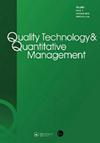A hybrid maintenance policy for a protection system under internal degradation and shocks: a case study in a steel industry
IF 3
2区 工程技术
Q3 ENGINEERING, INDUSTRIAL
Quality Technology and Quantitative Management
Pub Date : 2023-09-16
DOI:10.1080/16843703.2023.2257974
引用次数: 0
Abstract
ABSTRACTProtection systems are designed so that they can prevent disasters when critical events (demands) occur. These systems are usually inactive and their functionality is only noticeable during a demand or through inspections. Furthermore, the level of deterioration of the system can worsen due to the actions of external events (shocks), which can accelerate the process of its natural wear. Thus, in order to ensure the readiness of such systems, we modeled a hybrid inspection and replacement policy for safety brakes subject to shocks. The policy considers additional inspections beyond the scheduled inspections subject to misclassification. The system is replaced when any inspection indicates that it has failed, either immediately after the Mth inspection, or immediately after the Kth met demand, or immediately after an unmet demand – whichever comes first. Our model is motivated by a real case of a safety brake in a steel mill. We compared this policy with two other classical policies and saw that it has significant cost-saving potential in relation to both. The results indicate how important inspections are for systems with hidden failures and show when the observation of shocks should be prioritized over inspection actions.KEYWORDS: Maintenance modellingshock damagepreventive maintenanceimperfect inspection AcknowledgementsThis study was financed in part by the Coordenação de Aperfeiçoamento de Pessoal de Nível Superior - Brasil (CAPES) - Finance Code 001. The work of Augusto Rodrigues has been supported by FACEPE (Fundação de Amparo à Ciência e Tecnologia do Estado de Pernambuco). The work of Cristiano Cavalcante and Alexandre Alberti has been supported by the CNPq (Conselho Nacional de Desenvolvimento Científico e Tecnológico).Disclosure statementNo potential conflict of interest was reported by the author(s).Data statementThe data presented in this article were calculated using code written in python. This code calculates the cost-rate using the expressions presented in the paper. A demonstrator of the code can be accessed here: https://augustojsrodrigues-kmt-analytical-code-yxz40z.streamlit.app/. With this code, the reader can verify the results presented and explore new cases.Additional informationFundingThe work was supported by the Conselho Nacional de Desenvolvimento Científico e Tecnológico Conselho Nacional de Desenvolvimento Científico e Tecnológico [CNPq-435591/2018-5]; Coordenação de Aperfeiçoamento de Pessoal de Nível Superior [Finance Code 001]; Fundação de Amparo à Ciência e Tecnologia do Estado de Pernambuco [IBPG-1297-3.08/19].Notes on contributorsAugusto José da Silva RodriguesAugusto José da Silva Rodrigues received his B.Sc. degree (2018) and his M.Sc. degree (2020) in Industrial Engineering from Federal University of Campina Grande (UFCG, Brazil) and Federal University of Pernambuco (UFPE, Brazil), respectively. He is currently a Ph.D student in Industrial Engineering at UFPE. Also, he is a Member of RANDOM (Research Group on Risk and Decision Analysis in Operations and Maintenance) at UFPE, and a Member of the Institute of Mathematics and Its Applications (IMA, U.K.). His current interests include applied operational research, focused on maintenance and reliability modelling.Flávia Ataide da MottaFlávia Ataide da Motta received her B.Sc. degree (2003) and her M.Sc. degree (2012) in Mechanical Engineering from University of Pernambuco (UPE) and from Federal University of Pernambuco (UFPE), respectively. She is Engineer at UFPE where she is doing her Ph.D. Her research interests include maintenance modelling, safety risk assessment and heat transfer.Cristiano Alexandre Virginio CavalcanteCristiano Alexandre Virginio Cavalcante is a full professor at Federal University of Pernambuco (UFPE), Brazil. He received his B.Sc. degree in Mechanical Engineering from UFPE, in 2001, and M.Sc. and Ph.D. degrees in Industrial Engineering from UFPE in 2003 and 2005, respectively. He also held two Post-Doctorates, at UFPE (2006) and at University of Salford, England (2008). Dr. Cavalcante has been the recipient of a research fellowship from the Brazil National Research Council (CNPq) since 2009. Also, he is the leader of RANDOM (Research Group on Risk and Decision Analysis in Operations and Maintenance) at UFPE, Fellow of the Institute of Mathematics and Its Applications (IMA, U.K.) and a Senior Member of the Institute of Electrical and Electronics Engineers (IEEE). He has authored or coauthored more than 60 scientific papers in peer-reviewed journals on topics related to: operational research, maintenance modeling, risk, reliability, safety, warehouse management, warranty, and MCDM/A (multicriteria decision making and aid).Alexandre Ramalho AlbertiAlexandre Ramalho Alberti is an Assistant Professor in the Department of Industrial Engineering at Federal University of Pernambuco (UFPE), Brazil. Also, he is a Member of RANDOM (Research Group on Risk and Decision Analysis in Operations and Maintenance) at UFPE. He received his B.Sc. degree in Mechanical Engineering from Federal University of Santa Catarina (UFSC), Brazil, in 2014, and M.Sc. and Ph.D. degrees in Industrial Engineering from UFPE in 2018 and 2020, respectively. His research interests focus on applied operational research.内部退化和冲击下保护系统的混合维护策略:钢铁工业案例研究
此外,他还是upe运营和维护风险和决策分析研究小组(RANDOM)的成员。他于2014年获得巴西圣卡塔琳娜联邦大学(UFSC)机械工程学士学位,并于2018年和2020年分别获得UFPE工业工程硕士和博士学位。主要研究方向为应用运筹学。
本文章由计算机程序翻译,如有差异,请以英文原文为准。
求助全文
约1分钟内获得全文
求助全文
来源期刊

Quality Technology and Quantitative Management
ENGINEERING, INDUSTRIAL-OPERATIONS RESEARCH & MANAGEMENT SCIENCE
CiteScore
5.10
自引率
21.40%
发文量
47
审稿时长
>12 weeks
期刊介绍:
Quality Technology and Quantitative Management is an international refereed journal publishing original work in quality, reliability, queuing service systems, applied statistics (including methodology, data analysis, simulation), and their applications in business and industrial management. The journal publishes both theoretical and applied research articles using statistical methods or presenting new results, which solve or have the potential to solve real-world management problems.
 求助内容:
求助内容: 应助结果提醒方式:
应助结果提醒方式:


